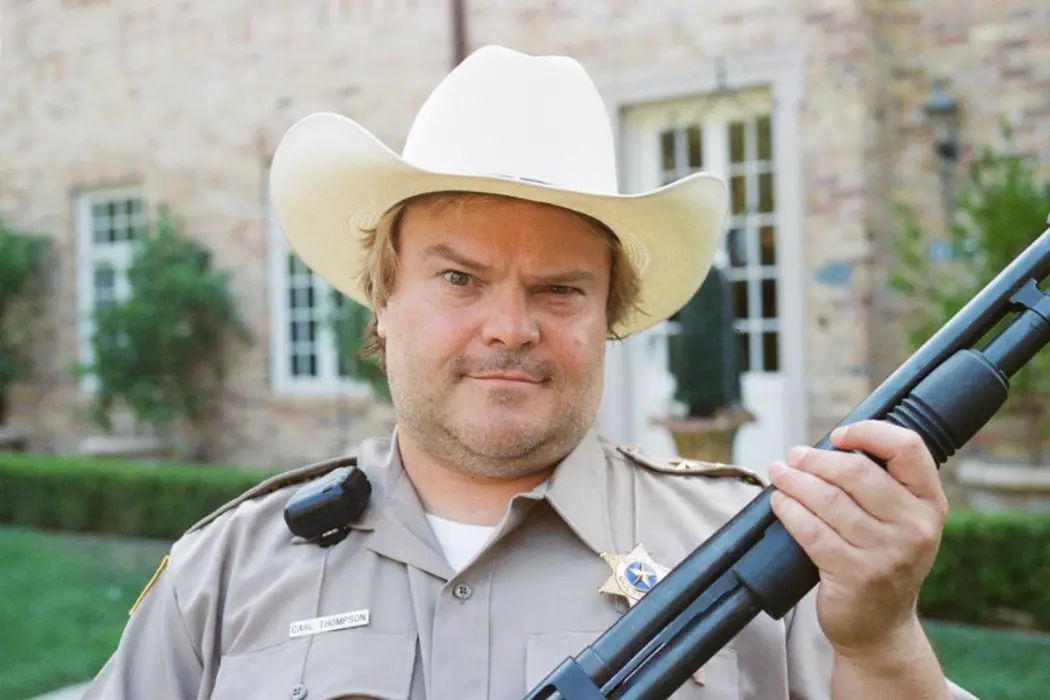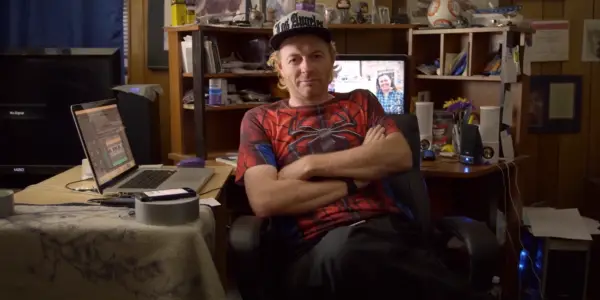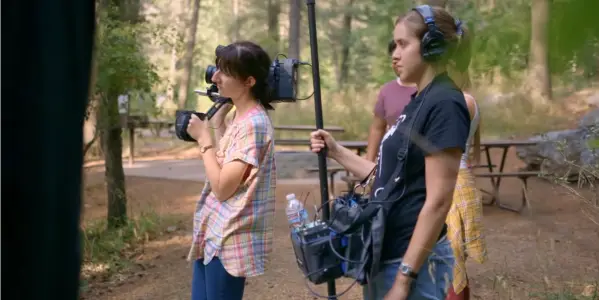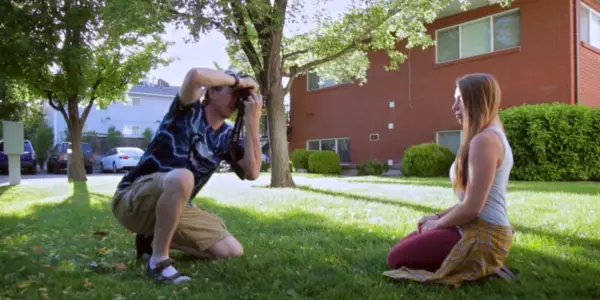Sheffield Doc/Fest 10: THE INSUFFERABLE GROO: Endearing Doc Profiles Egocentric But Inspiring Amateur Filmmaker (& Interviews)

Musanna Ahmed is a freelance film critic writing for Film…
As Matthew Heineman pointed out to me in our interview at Sheffield, the access to film technology has become democratised to a point where anyone can pick up a camera and make a film. There are several online platforms where filmmakers can distribute their films. Had Stephen Groo’s filmmaking skills been as good as his abilities to capture 148 shots a day – about ten times more than Spielberg and Kubrick – and keep persuading people to work with him, then he’d be a pioneer of the YouTube age of film.
The Insufferable Groo review
Stephen Groo has been making independent, self-produced, directed, and edited short films for almost two decades. His work is incredibly amateurish and isn’t considered to be quality filmmaking by any measure of technical ability. Nevertheless, he’s persisted to get his career off ground and has worked on 166 films in 17 years. His path in filmmaking began as the millennium approached, when the digital age began to flourish, with a short film entitled The Stalker.

The short bears a resemblance to Steven Soderbergh’s latest film Unsane. Could Groo’s influence run deeper than we think? Soderbergh may or may not have seen the Utah auteur’s work but it’s caught the attention of a couple of filmmakers including Scott Christopherson, the director of this documentary, and producers Jared Harris and Jared Hess, the latter who’s known for directing offbeat comedies such as Napoleon Dynamite and Nacho Libre.
After all this time and effort, Groo is given the opportunity to direct any film he wants after the producers team up with him for a project. He selects to do a remake of his elf/human love story The Unexpected Race with a dream all-star cast in mind that includes Bruce Willis, Sam Rockwell and Jack Black. Hess’ involvement, having directed Black in Nacho Libre, makes it possible to get the School of Rock star on board. The Insufferable Groo is both a look at Stephen Groo’s career through interviews with the man himself, family, friends and collaborators and a making-of documentary on The Unexpected Race.
It would be fascinating to know how Groo pools his resources because, even though he is a one-man band, there has evidently been a boatload of people who have worked with him throughout the better part of two decades. Several of them offer their perspective on his movie-making mindset in talking heads. The likely answer is that he really knows how to sell himself – one actress speaks of signing on for the film after the description in the casting call made it sounded like the most amazing project, helmed by the most amazing director.

Possessing the best marketing and communications skills seems like an obvious conclusion until you realise you’ve never heard of Stephen Groo before seeing this documentary – at the time of writing, his YouTube channel has less than 600 subscribers and 99% of his videos have less than one thousand views.
Initially, it’s easy to warm up to Groo because he doesn’t present himself in a pretentious or hyperbolic way (like the infamously bad directors Tommy Wiseau and Troll 2’s Claudio Fragasso), nor is he delusional about some of the comments he receives online about his work, especially since he does live-action versions of existing IP’s such as Resident Evil, Batman, Assassin’s Creed. So he attracts audiences familiar with the source material but blind to his work and, as a result, they express vitriol for his amateur attempts at recreating the thing they love. You can’t please everyone.
He also appears to be open to ideas suggested on set that could improve the film. Christopherson ensures that all the kind words about Groo’s character and the love for his work are shared at the start of the documentary. Once we’re introduced to his wife, Sherry, and cinematographer Lauren Vanderwerken enters the picture, then any allegiance we’ve forged for the cult of Groo begins to be tested. Yes, he makes films at an envious pace and is remarkably perseverant like nobody else in the industry, but it comes at a huge financial cost to his family. The household is supported by the one thousand dollars that Sherry makes a month from a regular job since her husband isn’t working one and the films provide no income.

Vanderwerken, a young and clearly intelligent DP, is like any other person looking to break into the industry, in that she needs to take all the opportunities she can get, so she steps in to film The Unexpected Race. The tension between her and Groo reaches a boiling point after he refuses to take her suggestions one too many times. Other collaborators who appear later in the film critique his somewhat totalitarian approach to filmmaking and at least one mentions that he’s ceased his professional – and consequently personal – relationship with the man. As Christopherson and producer Jared Harris reaffirm in our interview, Stephen Groo is a narcissist but won’t admit it.
Christopherson’s narrative structure is straightforward but perfectly balanced in depicting the past and the present and unifying them for his character study. He adds some verve to the presentation with crudely animated sequences depicting various real-life scenarios that change as more details are provided by the contributors sharing the anecdotes. Video game-like character profiles flavour the film with visual gags. There’s a natural humour in the premise of the film but the laughs are also constructed through calculated cuts, like the opening scene where Groo is shooting a scene of himself trying to throw a knife into a tree. It takes many, many attempts.
Jack Black, who’s hysterical in every scene he’s in, provides an on-camera interview in between shooting his Unexpected Race scenes and says about his director’s work, “There’s a certain charm in the lack of polish.” It’s the same endearing quality that’s gifted cult status to several other films such as The Room and Birdemic: Shock and Terror. Stephen Groo just wants to have fun and is confident in his ability to act and direct.

By the end of The Insufferable Groo, you may not have the same affection for the filmmaker that is clearly held by Christopherson, Harris and Hess but it’ll be hard to walk away without feeling that your own filmmaking dreams aren’t possible. It took 17 years but finally somebody saw his efforts, and the remake of The Unexpected Race may well be the beginning of a higher stage in Stephen Groo’s filmmaking career. The Insufferable Groo is an endearing and often funny profile of an amateur filmmaker who’s equally as inspiring as he is narcissistic.
Interview with Scott Christopherson and Jared Harris
I was able to speak to director Scott Christopherson and producer Jared Harris at the festival and we discussed what they like the most about Stephen Groo, Groo’s approach to recruiting collaborators and the challenges of producing both the documentary and The Unexpected Race.
Musanna Ahmed for Film Inquiry: To begin with, I want to ask about the title change from The Magic of Groo to The Insufferable Groo. Was that change born in the edit?
Scott Christopherson: Yes. We had The Magic of Groo title for a while.
Jared Harris: It was kind of a working title, really.
Scott Christopherson: Yeah, we weren’t locked into it and we decided it was a little more honest and more representative of Steve to change it to Insufferable. Though Steve isn’t wild about the term ‘insufferable’ and doesn’t love being called a narcissist but who does? But I think that, as you can see in the film, he can sometimes be a challenging character to work with. And so can I, at times. I think we can all be challenging to work with.

Jared Harris: That’s not true, Scott’s a pleasure to work with.
Scott Christopherson: But yeah that happened in post-production and we were going through all kinds of titles.
Jared Harris: Magic of Groo is what we had on the project at the very beginning. We became used to it so it was a hard decision for us to change it but for me it came down to giving the film a name where you wouldn’t have any expectations about him going in and whilst there is a little bit of that with the word ‘insufferable’, we didn’t want to automatically make it look like it was just a fan-made film about him, though we are fans. We wanted to have an honest title about not just who he is as a director and creator but also as a person to some extent.
Compared to other films I’ve seen about filmmakers who make films with a lack of polish, like Best Worst Movie and American Movie, one thing that stood out to me is that Steve is frank and non-delusional about the reactions he receives and his process to making films. What were the qualities about him that you found so endearing?
Jared Harris: Like Scott said, Steve can be difficult at times but that’s just because he wants so badly what he wants and he’s willing to work hard and be very direct to get that. He’s honest with people and doesn’t have a filter about getting what he wants from them. A lot of us have a social filter of being overly nice so my favourite qualities about him are his work ethic and passion. I think he’s a talented director too. He can see his projects in his head completely, from beginning to end. He can see all the shots in his head and is editing everything in his head as he shoots. He’s not winging it or figuring it out as he goes along and that’s a real talent.

Scott Christopherson: I would say that his endearing qualities are his passion and his honesty. I think people at the premiere last night were inspired by his passion for making films. I don’t love all his films, frankly, and that’s fine. I’ve told him that, but I’m inspired by how he keeps creating. As a filmmaker myself, I’m a few degrees different to Steve. I have a stable job as a documentary film professor but if I didn’t have that I could be in the same boat as him.
You just mentioned the difference between you and Steve but do you see any similarities in your philosophies approaches to filmmaking?
Scott Christopherson: Well, he’s a fiction filmmaker and I make documentaries, so the way I approach stories is different in that I let them unfold and don’t have a lot of control over what happens. As far as similarities, like Jared said, we both have a complete initial vision for our films. I had a vision for this film – in an ideal world, we knew we wanted to get Jack Black but we didn’t know him and we weren’t sure we could get him. From day one, we thought it would be cool if he could get one of the A-list actors on his wish list in one of our films. In that vision, I wanted to see him go through his struggles, then get Jack Black in the end and that happened but it was kind of miraculous because it’s not something you can’t really plan out.
As I understand, as well as being producers of The Insufferable Groo, both of you were also involved with The Unexpected Race in a producing capacity?
Jared Harris: I was.

So, was there the risk of hijacking the narrative of this documentary or distorting the reality of it?
Jared Harris: That was definitely a dilemma for me. Ultimately, I was saved by Steve because he’s so opinionated and passionate so even though I “produced” his film, I was probably the assistant producer to him. My most important thing was making sure everyone was taken care of as much as possible because he does work really hard and doesn’t stop for breaks so usually there’s only one half-hour lunch break in an 18-hour day.
I wanted to make sure that both my documentary crew and his crew were taken care of. The first day we shot his film, he had already planned out all the meals and had bought all the food upfront for probably the first six shooting days out of ten. For lunch he was mostly planning on peanut butter and jelly and turkey sandwiches.
Scott Christopherson: Baloney sandwiches.
Jared Harris: [laughter] Baloney sandwiches, yeah. So, we bought lunch for the documentary crew separately on the first day in order to keep both worlds separate but the second day I just thought, “I can’t let everybody work 18 hours and just have a baloney sandwich”. So, the rest of the time I bought lunch for everybody and did other things too like coffee and smoothie runs.
So, my role as producer on his film was mainly to do with taking care of the team in terms of food and drinks. There’s a scene in the film where Steve shoots a scene on the mountain and gets kicked off for not having a permit and normally I would get a permit but that required a lot more time for preparation and costs and, considering the speed he works at, he didn’t want to get a permit so ultimately, I just followed his lead and I did that at other times too.

Scott Christopherson: I also produced the doc too because Jared can’t do 20 things at once so when he had to help out on Steve’s film, I had to carry the load as far as producing the doc as well as our other producer Eric (Robertson). We had to carry the balance in terms of distorting the doc and our motto was “Groo will be Groo”. Let him be himself, let it be the Groo experience, and Jared was good at making sure of those things like not solving his problems for him.
Groo is a one-man band when it comes to serving as the creative lead of his films, writing, editing, directing, etc. but did you figure out how he managed to have so many collaborators over the years? How did he sell himself to those who took on smaller roles in his films?
Scott Christopherson: From what I gleaned, there are so many people that are desperate to work in the film industry everywhere. Steve is so confident in himself and in his vision so he’s good at expressing what he wants to do and maybe people are attracted to that confidence. They like seeing that and over the years he’s attracted a countless number of people to work him. Jared may have a different response since he’s hired actors and actresses in the commercial world.
Jared Harris: I think what Scott said is exactly right. You see that in the film with the lead actress of The Unexpected Race and even Jack Black too who says that Groo’s enthusiasm was infectious. Jared Hess too. Steve believes that everybody wants to have a part in his films and that’s true to some degree. In making this movie I’ve come across other similar stories.
You mentioned other movies that have been made in similar worlds and that’s not uncommon and I think the reason that happens is because like Scott said it’s that, whatever it is about the world of film, perhaps the glitz and glamour of Hollywood, there’s something that pulls people in. I tell everybody that I have the best job in the world. Not that I’m making Hollywood movies but anytime I tell someone I’m involved with filmmaking they’re like “Oh, that’s cool!” Steve uses that to his advantage and other people aren’t making as much films as he is.
As we see in the documentary, you speak to his sons who are also involved in their father’s films. Considering the hardships that the family goes through, but also the good fortunes too, do you know if the sons will follow their father’s footsteps into filmmaking?
Scott Christopherson I’m not exactly sure if they want to go into filmmaking but I know they write stories. Stephen Jr writes short stories and is a good writer. I know they all look up to their dad so I won’t be surprised if they want to go into filmmaking. One cool thing is that Steve and his wife dress up in Star Wars costumes and the kids love dressing up in them too. The family will then go around to grocery stores or fast food restaurants and that’s a bi-weekly family outing for them and they love to do it. It’s their way of life, a big part of their upbringing, so I can see it happening.
Jared Harris: It seems like people who have parents who are creative often go into creative worlds themselves. Stephen Jr. is just 13, so it’s hard to know how he’ll be like in 5 years but I wonder what he’ll be like when he reaches high school because that’s when you start seeing your parents in a different way. Like Sheri mentioned, Steve Jr is doing a theatre camp in the summer so I’m sure that he’ll do something creative. We’ve asked them if they like working on movies and they definitely love being involved. It’s not in the film but we asked Steve Jr. specifically what he wanted to do when he grew up and he said that he wanted to be a writer.
When can we expect to see The Unexpected Race?
Jared Harris: When can you expected to see the unexpected. [laughter]
Scott Christopherson: We actually toyed with titling this film “What to expect when unexpecting a race”. [laughter] Steve has been trying to sell the film for almost a year. As soon as our film is distributed, I’m hoping it sells soon after.
Jared Harris: It’s only a matter of time before it’s available to see online.
Scott Christopherson: We’re looking for the right distribution deal. I’m confident this doc will be distributed and have a broad audience. We have a really good sales agent, Ben Braun at Submarine, he’ll find a really good home for it and I think it’ll have international legs so, with the documentary going places, I think that’ll carve a path for Steve’s film. That’s our dream, to open up those doors for Steve, because his film is amazing. Jack Black’s fantastic. It’s definitely Groo’s masterpiece.
Film Inquiry would like to thank Scott Christopherson and Jared Harris for their time and insight.
The Insufferable Groo doesn’t have a theatrical release date yet. The film had its world premiere at Sheffield Doc/Fest 2018 and will continue to screen in festivals around the world. The Unexpected Race is currently seeking a distributor too.
Doc/Fest 10 is a series of combined review and interview features for ten films seen at the Sheffield International Documentary Festival 2018. You can view the rest of the features by clicking here.
Does content like this matter to you?
Become a Member and support film journalism. Unlock access to all of Film Inquiry`s great articles. Join a community of like-minded readers who are passionate about cinema - get access to our private members Network, give back to independent filmmakers, and more.
Musanna Ahmed is a freelance film critic writing for Film Inquiry, The Movie Waffler and The Upcoming. His taste in film knows no boundaries.













